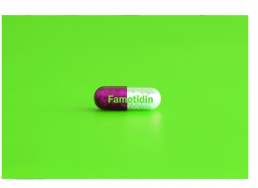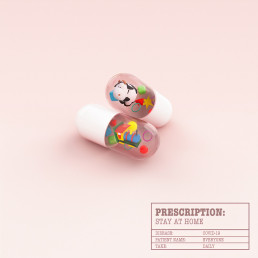Famotidine and COVID
Based on preliminary data, famotidine a common heart burn medication that is available both by prescription and over the counter, may play a role in fighting COVID-19. This is based only on a small observation on data from patients in China who had heartburn and contracted COVID-19. From the study it was observed that 22% of the 1,536 patients who were not on famotidine died or were intubated and put on a ventilator. This was compared to the 84 patients that were on famotidine and 10% died or were put on a ventilator.
What is the mechanism behind famotidine?
The answer is unclear and needs to be researched further to validate if famotidine is beneficial in COVID-19. Zantac (or ranitidine) which belongs to the same class of medication was not shown to be effective against COVID-19. In addition, computer modeling has shown that the mechanism that famotidine uses to fight heartburn may also help against COVID-19. It does not appear to bind to an enzyme as some had speculated but rather it plays a role with histamine and COVID-19. Additional studies need to be performed before an answer is concluded.
There is a study in New York that is being conducted using high doses of famotidine in IV. The researchers will be posting the results as soon the trial ends. So, should you be using famotidine? There is not enough evidence to indicate to start taking famotidine. If you have heartburn and are concerned about COVID-19 work with your provider and pharmacist.
Reference:
- https://www.cnn.com/2020/05/09/health/famotidine-covid-19-correlation-study/index.html. Accessed on June 14, 2020
- https://blogs.sciencemag.org/pipeline/archives/2020/05/29/famotidine-histamine-and-the-coronavirus. Accessed on June 14, 2020
- https://www.drugtopics.com/latest/famotidine-trial-underway-nyc-covid-19-treatment. Accessed on June 14, 2020
- https://www.cuimc.columbia.edu/news/heartburn-drug-may-have-potential-against-covid-19. Accessed on June 14, 2020
Update on Potential Promising COVID Drug Treatments
Hydroxychloroquine and Chloroquine and Macrolide (azithromycin)
World Health Organization (WHO) recently announced in late May that it will temporarily pause the hydroxychloroquine arm of the Solidarity Trial as it reviews safety data. There have been several warnings of using these drugs outpatient as it may cause QT prolongation. QT prolongation is a heart complication that is harder to monitor outpatient vs in the hospital. The WHO did state that hydroxychloroquine and chloroquine are accepted as generally safe for use in patients with autoimmune diseases or malaria.
The Solidarity Trial is an international clinical trial that was launched by WHO to study treatments for COVID-19.
On May 22 data from the Solidarity Trial was published in the Lancet showing that hydroxychloroquine with or without a macrolide (azithromycin) did not demonstrate in-hospital clinical benefits in patients with COVID-19. In addition, the authors of the study reported higher mortality rates among patients receiving the drug according to the findings. WHO temporarily paused this arm of the trial, however the remaining arms of the study continued. The drug treatments that continued to be studied in the Solidarity trial were: Remdesivir, Lopinavir/Ritonavir and Lopinavir/Ritonavir with Interferon beta-1a. Later in early June WHO stated that it will resume studying hydroxychloroquine.
More about drug treatments in Solidarity Trial launched by WHO.
Remdesivir is one of the drug treatments that WHO is studying in the Solidarity Trial. Remdesivir was previously tested as an Ebola treatment. It showed promising results against Middle East Respiratory Syndrome (MERS-CoV) and severe acute respiratory syndrome (SARS) which are caused by coronaviruses and therefore suggesting that there may be promise in COVID-19.
GILEAD the manufacture of Remdesivir is studying the drug in a phase 3 trial titled SIMPLE trial. GILEAD recently announced the results of the SIMPLE trial and reported that the drug showed benefit in patients that are hospitalized by COVID and pneumonia vs placebo.
Remdesivir as of today is not FDA approved, however it has received emergency use authorization use by the FDA for emergency use for the treatment of hospitalized COVID-19 patients. As of today, Remdesivir is not available as an outpatient treatment as it is an IV agent administered by IV. Depending on whether the patient requires mechanical ventilation or not, dosing can be either for 5 days or 10 days. An initial bolus dose is administered followed by a daily dose.
COVID information is rapidly changing however Remdesivir still seems promising.
Lopinavir/Ritonavir is an FDA approved treatment for HIV. It’s tradename is Kaletra®. It is one of the drug treatments that is being studied by WHO for COVID-19 in the Solidarity Trial.
Per WHO studies for using lopinavir/Ritonavir for treatment of COVID-19 as well as MERS and SARS have been inconclusive. However, studies in the lab show that it may be effective against COVID-19 and the drug has been included in the Solidarity trial to investigate its use.
In addition to studying lopinavir/ritonavir alone for COVID-19 the combination with Interferon beta-1a is also being researched.
Interferon beta-1a is a drug used to treat multiple sclerosis. It goes by the trade name Rebif® and Avonex. The difference between the two is the dosing, route of administration and storage. From the data I could gather it appears that the Rebif, which is a premixed syringe is being used in the Solidarity trial.
In no way does this article state these drugs are treatments for COVID-19. This article is for informational purposes and any concern should always be discussed with your provider.
Reference:
- https://www.emdgroup.com/en/news/who-media-statement-07-04-2020.html. Accessed on June 3, 2020
- https://www.ncbi.nlm.nih.gov/pmc/articles/PMC7138382/. Accessed on June 3, 2020
- https://clinicaltrials.gov/ct2/show/NCT04321616. Accessed on June 3, 2020
- https://clinicaltrials.gov/ct2/show/NCT04330690. Accessed on June 3, 2020
- https://clinicaltrials.gov/ct2/show/NCT04315948?term=interferon&cond=%22Coronavirus+Infections%22&draw=2&rank=8. Accessed on June 3, 2020
- https://www.fda.gov/media/137564/download. Accessed on June 3, 2020
- https://www.who.int/emergencies/diseases/novel-coronavirus-2019/global-research-on-novel-coronavirus-2019-ncov/solidarity-clinical-trial-for-covid-19-treatments. Accessed on June 3, 2020
- https://www.nejm.org/doi/full/10.1056/NEJMoa2007764. Accessed on June 3, 2020
- https://www.remdesivir.com/us/dosing-administration/?gclid=EAIaIQobChMIw_GZ0JLn6QIVhT6tBh3k2wOeEAAYASAAEgJRpfD_BwE&gclsrc=aw.ds. Accessed on June 3, 2020
- https://www.drugtopics.com/coronavirus/gilead-announces-phase-3-trial-results-remdesivir-patients-moderate-covid-19?rememberme=1&GUID=07E9F701-1AF8-406B-9F76-31BC61376A0D. Accessed on June 3, 2020
- https://www.drugtopics.com/coronavirus/who-suspends-hydroxychloroquine-study-arm-covid-19-solidarity-trial. Accessed on June 2, 2020
- https://www.who.int/emergencies/diseases/novel-coronavirus-2019/global-research-on-novel-coronavirus-2019-ncov/solidarity-clinical-trial-for-covid-19-treatments. Accessed on 06/02/2020

